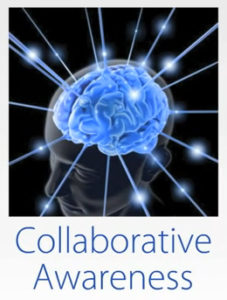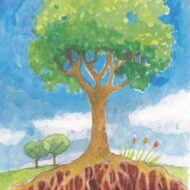 Whether you’re the CEO of a company, the super mom of a household, or the wide-eyed 7-year old in a room, you know the power of being in a group that plays well together!
Whether you’re the CEO of a company, the super mom of a household, or the wide-eyed 7-year old in a room, you know the power of being in a group that plays well together!
Think of a time when you were working on a project or creating a family experience and the group was cooperating beautifully. I imagine ideas were sparking, people were curious about one another, everyone was contributing, it was fun to be together, and smiles were flashing from face to face. Isn’t it true that being able to do the dance of successful collaboration brings joy, inspiration and unimaginable opportunities into companies, families, classrooms, and groups of all types?
So what makes a group collaborate well? And how does collaboration connect with performance or individual happiness? A recent study led by Anita Williams Woolley from Carnegie Mellon University looked into what makes groups perform better, studying what they called the intelligence of groups. Her team recognized that in today’s world, such skills are critical. “More and more, people need to collaborate to solve problems,” she says.
The study found that a group’s intelligence is highly influenced by the quality of interactions between the individuals. Opportunities for equal participation, distributing turn-taking, and how socially sensitive the group members were proved to be the key factors in predicting a group’s intelligence. -source
This leads me to think about how we develop the skills for social sensitivity. How do we learn to better understand what other people are thinking and feeling in a moment? How do we become more graceful at allowing other people a chance to talk and genuinely valuing the contributions that they make?
 One tool that I’ve been using lately and loving comes from The Center for Collaborative Awareness and is called The State of Grace Document. This is a collaboration process used to establish healthier, more resilient business and personal relationships. It is a practical way to learn more about the people you’re relating with, understanding what makes them tick. It gives you a window into their thoughts, feelings, habits and ways of interacting and allows you the opportunity to specifically desgin your relationship. I’ve found these practices potent for increasing social sensitivity.
One tool that I’ve been using lately and loving comes from The Center for Collaborative Awareness and is called The State of Grace Document. This is a collaboration process used to establish healthier, more resilient business and personal relationships. It is a practical way to learn more about the people you’re relating with, understanding what makes them tick. It gives you a window into their thoughts, feelings, habits and ways of interacting and allows you the opportunity to specifically desgin your relationship. I’ve found these practices potent for increasing social sensitivity.
Sedona, age 14, participated in the Milestones Project, Wise at Heart, and she notes that “people get angry at each other because they don’t understand each other.” So why not invest our energy in understanding one another better? Not only can it make us feel happier and more connected, but as teams and families we can actually become more successful!
You can also watch this 3 minute video to learn more about The State of Grace Document, also called the “Blueprint of WE”.
Colorful puzzle piece image from LuMaxArt and all other images from Center for Collaborative Awareness



I love this. But I also wonder about what happens, or could happen, when the understanding that you get, the insight and empathy, leads you inexorably to a realization that you feel anger or resentment, because the person is doing ‘bad things’? It is good perspective, if, for ex., you come to understand that the guy who just assaulted you had a horrible childhood, and you can learn to find forgiveness over time, but you’re not angry because you don’ t understand him, you’re angry because he assaulted you. Have been thinking about this issue, the difference between the righteous indignation that comes from witnessing, or being a victim of, aggression and wanting to protect self or others, and anger that comes from (fill in the blank).